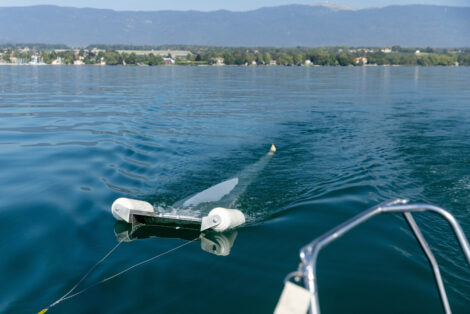Plastic levels in Swiss-French lake as high as world’s oceans

A device of NGO Oceaneye collects plastic fragments in the water of Lake Leman in Founex, near Geneva, Switzerland, August 21, 2023. REUTERS/Denis Balibouse
FOUNEX, Switzerland — Lake Geneva, nestled at the foot of the Alps, has long been considered as a near-pristine body of water, but new research has found that its plastic pollution levels are as high as those in the oceans.
Oceaneye, a Geneva-based non-profit that has for more than a decade been scouring the seas to collect plastic fragments, has turned its attention closer to home to landlocked Switzerland.
“We compared the levels with the ocean data and reached the conclusion that the microplastic pollution on the lake surface is the same order of magnitude as the oceans,” said Pascal Hagmann, the founder and director of Oceaneye.
READ: Microplastics: Why we now already breathe, ingest killer plastics
He was speaking from the stern of a sailing vessel that was dragging a sample-collecting device across Switzerland’s biggest lake, also known as Lac Leman.
“We found that interesting because we often have the image of the Leman Lake as a big Alpine lake with crystal waters but it’s not really the case,” he said, using the French name.
The crescent-shaped lake is the largest in Western Europe covering 580 square kilometers (224 square miles) straddling France and Switzerland and is fed partly by Alpine glaciers. It spills into the Rhone River which eventually flows into the Mediterranean Sea.
READ: Microplastics in Metro Manila air alarm scientists
Switzerland’s bordering cantons treat the water and then pipe it into homes as drinking water. One of the lakeside towns, Evian, on the French side, is also the name given to a brand of bottled water from a natural spring.
Microplastics derive from the breakdown of various consumer and industrial plastic waste over time and their concentrations are accumulating in the world’s oceans. They have even been found in the blood samples of unborn babies and scientists are trying to understand the health risks of the phenomenon for people and animals.
READ: Rise in ocean plastic pollution ‘unprecedented’ since 2005
Hagmann said he was worried that rising plastic consumption over time will lead to more litter ending up in water systems. “We are seeing the growth curve rise very quickly. Projections are pessimistic if we do nothing,” he said, although he acknowledged that at least awareness of the issue was growing. “When we began working on this 12 years ago and talked about plastic fragments in water, people took us for wackos and now it is a recognised problem.”